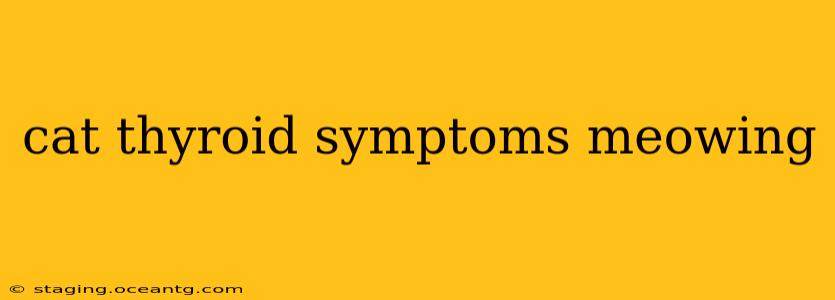Cats are known for their subtle communication, but sometimes, a change in their vocalizations can signal a serious underlying health issue. Increased meowing, particularly if accompanied by other symptoms, could be a sign of hyperthyroidism, a common hormonal disorder in older cats. This comprehensive guide explores the connection between excessive meowing and feline hyperthyroidism, helping you understand the symptoms and seek appropriate veterinary care for your beloved pet.
What is Hyperthyroidism in Cats?
Hyperthyroidism is a condition where the thyroid gland produces excessive amounts of thyroid hormones. This overproduction disrupts various bodily functions, leading to a range of symptoms. While the exact cause isn't always clear, it's more common in older cats and is often linked to benign tumors within the thyroid gland.
Common Symptoms of Feline Hyperthyroidism Beyond Excessive Meowing
While increased vocalization is a potential symptom, it's crucial to consider other indicators. Hyperthyroidism manifests in various ways, and a combination of symptoms often points towards a diagnosis. These include:
- Weight loss despite increased appetite: This is a classic sign, as the cat's metabolism is sped up.
- Increased thirst and urination: The body tries to flush out the excess hormones, leading to more frequent trips to the litter box.
- Restlessness and hyperactivity: The boosted metabolism can make cats more energetic and even jittery.
- Vomiting and diarrhea: Digestive upset is a common consequence of hormonal imbalance.
- Thinning hair coat: The cat's fur might appear dull, brittle, and less dense.
- Heart problems: Hyperthyroidism can put extra strain on the heart, potentially leading to heart murmurs or other cardiac issues.
Is My Cat's Increased Meowing a Sign of Hyperthyroidism?
Increased meowing alone isn't definitive proof of hyperthyroidism, but it should be considered alongside other symptoms. The change in vocalization might be due to discomfort, pain, anxiety, or cognitive changes related to the disease. The meows might be louder, more frequent, or have a different tone than usual. It's vital to consider the context of the meowing. Is it persistent throughout the day? Does it seem more insistent or desperate than usual?
What other conditions cause excessive meowing in cats?
Several other conditions can cause increased meowing in cats. These include:
- Pain or discomfort: Arthritis, dental problems, or other sources of pain can make cats vocalize more.
- Cognitive dysfunction: Similar to dementia in humans, cognitive dysfunction syndrome can lead to increased vocalizations and changes in behavior.
- Kidney disease: Kidney problems can cause discomfort and changes in behavior, including increased meowing.
- Sensory loss: Cats with decreased vision or hearing might meow more frequently to communicate.
- Stress or anxiety: Environmental changes or stress can increase a cat's vocalization.
How is Feline Hyperthyroidism Diagnosed?
A veterinarian will conduct a thorough physical exam and review your cat's history. Blood tests are essential to measure thyroid hormone levels, confirming the diagnosis. Other tests, such as ultrasound or fine-needle aspiration of the thyroid gland, might be necessary to assess the extent of the condition.
What are the Treatment Options for Hyperthyroidism in Cats?
Treatment options depend on the severity of the hyperthyroidism and your cat's overall health. Common treatments include:
- Medication: Oral medications can help regulate thyroid hormone production.
- Radioactive iodine therapy: This treatment effectively destroys overactive thyroid tissue. It's typically administered at a specialized veterinary hospital.
- Surgery: In some cases, surgical removal of the thyroid gland might be necessary.
Disclaimer: This information is for educational purposes only and should not be considered veterinary advice. If you suspect your cat has hyperthyroidism or any other medical condition, consult your veterinarian immediately for proper diagnosis and treatment. Early detection and intervention are crucial for managing this condition and improving your cat's quality of life.
